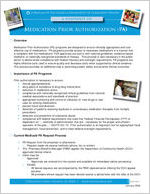A Progam Of The Georgia Department Of Community Health
A Snapshot Medication Prior Authorization (PA)
A SNAPSHOT OF
Medication Prior Authorization (PA)
Overview
Medication Prior Authorization (PA) programs are designed to ensure clinically appropriate and costeffective use of medications. PA programs provide access to necessary medications in a manner that is compliant with the medications' FDA-approved use and or with national guidelines, evidence based medicine, or nationally recognized standards of therapy. This process is also necessary in the public sector to demonstrate compliance with federal fiduciary and oversight requirements. PA programs are highly effective tools used to ensure quality and decrease costs when supported by clinical evidence.
This process provides an additional step in promoting patient safety and positive clinical outcomes.
Importance of PA Programs
Prior authorization is necessary to ensure: clinical appropriateness drug safety & avoidance of drug-drug interactions reduction in medication errors compliance with nationally recognized clinical guidelines from national medical associations and standards of practice appropriate monitoring and control of utilization of new drugs or new uses for existing medications prevent fraud and diversion detection of patients receiving duplicate or unnecessary medication therapies from multiple prescribers detection and prevention of substance abuse compliance with federal requirements that state that Federal Financial Participation (FFP) is dependent on "...methods of administration that are...necessary for the proper and efficient operation of the plan..." 42CFR 431.15. Prior authorization is an important tool for appropriate fiscal
management, fraud prevention, and to meet federal oversight requirements.
Current Medicaid PA Request Process
PA Request from the physician or pharmacist Request made via several methods (phone, fax or written)
The Pharmacy Benefits Manager (PBM) applies the Department of Community Health (DCH)approved clinical criteria Claim may be:
Approved. Approvals are entered into the system and available for immediate claims processing
Denied All denial requests are accompanied by the PBM representative offering the DCH appeal process. All providers whose request has been denied receive a denial letter with the offer of the DCH
2 Peachtree Street, Atlanta, Ga 30303 www.dch.georgia.gov
January 2008
A Snapshot Medication Prior Authorization (PA)
appeal process. Pended A request may be pended if further documentation is needed from the physician's office All pended requests for which the follow-up documentation is not received within 72 hours are denied. The PBM attempts three follow-up contacts with the physician within that 72 hour period to obtain the necessary information. All PA requests are either approved, denied, or pended within one business day of receipt. A first and second level appeal process is available First level Medicaid appeals are reviewed by a pharmacist at the PBM or a DCH Pharmacist depending on the drug being requested. All second level Medicaid appeals are reviewed by a DCH Pharmacist Written disposition of the appeal request is provided to the physician. Medicaid 1st level appeal requests are addressed within 48 hours of receipt. 2nd level appeal requests are addressed within 72 hours of receipt.
SPECIAL NOTE - Emergency override process is available to ensure access to necessary medications.
PA Decision Process
DCH monitors new drugs to market and utilization patterns of existing drugs The Drug Utilization Review (DUR) Board evaluates all new drugs after the drug has six months of market experience and makes recommendations to DCH. In the interim six months, DCH may or may not implement a PA depending on the characteristics of the individual drug. DUR Board evaluates all supplemental rebate drug categories on an annual basis and makes recommendations to the Department. Candidates for PA include but are not limited to:
Drugs with niche indications Drugs that are not first line therapies Drugs with significant safety concerns Drugs with less costly therapeutic alternatives Clinical literature is evaluated Prior authorization criteria is developed and approved by DCH Notice is given to providers via banner PA criteria is published on the web Implementation Post-implementation monitoring and evaluation
Impact of Removal of Pharmacy Prior Authorizations
The removal of prior authorization in pharmacy programs limits DCH's ability to appropriately manage the pharmacy benefit provided for its patients in a safe, clinically appropriate, and cost-effective manner. Such an action would result in an unmanaged pharmacy benefit with excessive and unnecessary utilization.
DCH plans affected include: Medicaid Fee-For-Service (FFS) and PeachCare for KidsTM State Health Benefit Plan (SHBP) The Medicaid Care Management Organizations (CMOs)
A Snapshot Medication Prior Authorization (PA)
Fiscal Impact of Removal of Pharmacy Prior Authorizations * Medicaid FFS - Over $13 Million per year state funds State Health Benefit Plan - Over $12 Million per year Medicaid CMO - Capitation rates would have to be increased by at least $33 Million per year
* Figures based upon report to the SB 140 Subcommittee: Fall 2005.
